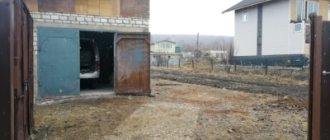Fine for an Unregistered House on a Plot SNT 2020
- registration of buildings is carried out only at the request of the owner, and therefore the authorities cannot oblige him to submit it;
- There are no deadlines for submitting documents for registration of a house;
- taxes are not charged on an unregistered cottage;
- There are no penalties for failure to meet payment deadlines.
- Acquisition for the purpose of reconstruction, demolition of a house
. If the house is already registered with government agencies, then adding a new wing or adding an attic is possible only after the process of coordinating actions in various authorities and making changes to the completed documents, which will require a lot of time and money. In turn, an unregistered house can be rebuilt in any way, up to complete dismantling and construction of a new one, and only after that can the registration process be initiated; - Reducing the time required for registering a transaction - the owner simply re-registers the “empty” plot to the buyer. If you insist that the seller first draw up the documents, then during this time another buyer may well appear who will agree to purchase the cottage without registration and, perhaps, will give a better price;
- There is no need for re-registration - registering a new owner is easier and faster than re-registration of all documentation for land and buildings.
How to recognize a self-built property as property
In order to recognize illegal construction as property, the following factors are necessary:
- the land plot must be owned by the developer;
- permission to build on this site;
- compliance of the building with all technical standards and building regulations;
- the building or structure must not harm the environment or violate the rights of other people.
The law provides for the legalization of unauthorized buildings in most cases, if they are brought into compliance with all norms and requirements.
- Thus, the owner of the building is obliged to inform the local authorities that he intends to build, complete or reconstruct an existing building, with a detailed description of his actions (project documentation).
- After reviewing all the documents, officials notify you of their decision.
- If the answer is yes, you are given the right to build and reconstruct the building for up to ten years.
- Upon completion of construction, it is necessary to prepare technical personnel. plan. After completing all the buildings and drawing up the project, paying the state fee, the administration, with the help of a special commission, verifies compliance with all requirements and legal norms, and only after that you receive the right to register your property
- The administration independently sends a request to Rosreestr for registration of real estate.
- It is also noted here that the owner of an illegal building that is subject to demolition has the right to receive compensation from local authorities if the owner did not know that the building he purchased was an unauthorized construction. Compensation is equal to the market value of the demolished property.
All these difficulties, most often, provoke a person not to inform the administrative authorities about developments on his site, since not everyone can understand all the intricacies of our legislation and firmly go through all the registration procedures.
But every developer must understand that despite all the difficulties of legalization, no one is exempt from liability before the law.
By legalizing unauthorized buildings, you can be sure that you will not be affected by problems in the form of fines and lawsuits. Also, the owner of an illegal building must be prepared for the fact that local officials may become interested in his development and come with an inspection. The reason for this check may be different, including complaints from ill-wishers (neighbors, competitors).
Laws of the Russian Federation 2020-2020
What if the house is still under construction? If construction began before August 4, 2020 (the date of entry into force of Federal Law-340), the law allows for retroactive notification. An unfinished house cannot be registered. Once construction is completed, notification will need to be submitted to local authorities.
You can carry out the entire procedure through the MFC; many citizens recognize interaction with specialists from multifunctional centers as more rational than with representatives of Rosreestr (convenient work schedule, provision of additional services, etc.). It is not yet possible to register ownership through State Services.
Don’t believe officials’ promises to formalize everything retroactively
Yet the courts do not reject either of the two points of view. Thus, the Federal Antimonopoly Service of the North Caucasus District, when discussing a report on the application of legislation on unauthorized buildings on May 14 last year, expressed the opinion that the decision to demolish an unauthorized building can be made both by a court and by a government body authorized to make decisions on the demolition of illegally erected buildings.
We recommend reading: Deadlines for payment of land tax for 2020 for individuals
When filing a claim for recognition of ownership of an unauthorized construction in accordance with Art. 222 of the Civil Code of the Russian Federation, such a claim must be based on acts of the competent authorities and other documents confirming the right to land. State registration of the emergence and transfer of rights to real estate in accordance with Art. 14 of the Federal Law of July 21, 1997 No. 122-FZ “On state registration of rights to real estate and transactions with it” (hereinafter referred to as Law No. 122-FZ) is certified by a certificate of state registration of rights, and state registration of contracts and other transactions is through a special registration inscription on a document expressing the contents of the transaction. But according to Art. 6 of Law No. 122-FZ, rights to real estate that arose before the entry into force of this law are recognized as legally valid in the absence of their state registration.
Features of purchasing a plot of land with an unregistered house
If you buy a house for which documents have just been drawn up, you may encounter a seller who will ask you to indicate in the papers an amount of less than one million rubles. This is done in order to avoid paying income taxes.
Despite the fact that such an action is illegal, it will not be possible to obtain a plot of land in any other way, since there are no legislative acts that would force agreements.
- the seller may refuse to formalize the transaction for the plot if the buyer demands to receive documents for the house before the sale;
- it may turn out that the built house does not comply with urban planning standards, then you will have to carry out repair work at your own expense;
- Knowing the features of the site and the house, neighbors can send a complaint, which will indicate that there is an unregistered object on the land, but this point can be easily circumvented if you start registering the property immediately after purchase.
Fines for illegal use of unauthorized construction and for failure to comply with a court decision:
- for individuals – 2-5 thousand rubles;
- for individual entrepreneurs – 25-50 thousand rubles or temporary suspension of commercial activities
- for legal entities - 100-300 thousand rubles or temporary suspension of activities by court decision for up to 3 months.
This Bill provides for cases when the court has the right to seize a land plot on which unauthorized buildings and structures were erected:
- inappropriate use of a given land plot (for example, construction of industrial structures on agricultural land, thereby disrupting soil fertility);
- in the process of activity causing harm to ecology and the environment;
- failure to comply with court orders to bring erected structures back to normal;
It follows from this that the state does not intend to wholesale land plots and their houses from citizens; this measure is an extreme one - if all court orders are not observed.
Registration of houses on the site
The initiative of the Ministry of Finance deserves additional attention, which involves levying a real estate tax on private buildings listed in the cadastre, but not registered as property. The purpose of the Ministry of Finance's proposal is to register with the tax service all unregistered houses and buildings, even if the rights to them have not been registered.
Expert opinion
Smirnov Alexander Stanislavovich
Lawyer with 12 years of experience. Specialization: civil law. Member of the Bar Association.
To date, there is no real estate tax for such objects, so this gap in the legislation has become a convenient loophole for many irresponsible Russians.
DDU with an expired construction permit retroactively
Agents and the developer propose to conclude a DDU under Federal Law-214 retroactively on October 6 (now December), since the construction permit expired on October 7, 2020, the developer does not want to renew it since delivery is at the end of December (friends from the industry suggest that renewing the permit is an easy process and it’s strange that the developer doesn’t do this).
Realtor agents (Presnya City project, apartments) say that the owners of the property (Coalco land, developer MR Group, project investor VTB) have agreements with Rosreestr and VTB Bank on today's registration of contracts signed retroactively. Allegedly, the reason why such a scheme is proposed is the reluctance to stop sales while the property is being registered.
This is interesting: It is true that a working pensioner will receive a pension with bonuses after leaving work
We pay a fine for an unregistered dacha plot
If such unregistered objects are discovered this year, the tax service will calculate the amount of payments for the last three years, adding a 20% fine to it. Correspondents of the publication RG asked BTI specialists from the Moscow region to calculate the approximate amounts of tax payments.
The results were significant. For example, the owners of an unregistered house in Istra with a total area of 331 square meters.
You can apply to register your home right now! Our experienced lawyers will help you carry out these procedures competently and on time. To get advice on registration of rights or cadastral registration, contact us and we will advise you free of charge by phone.
What else can they be punished for?
In addition to construction, it will be illegal to carry out excavation, construction, economic and other types of work without obtaining permission from the cultural heritage protection authorities, when it is required. This applies to the reconstruction of the old foundation, which is classified as a cultural heritage site. You can view more detailed information in the same Code “On Administrative Offences”, Article 7.14 and in Article 52 of the Town Planning Code.
Fines - from fifteen thousand to one hundred thousand for citizens, from twenty to three hundred thousand for officials, from one hundred thousand to a million for legal entities.
Unregistered houses and plots are recognized as ownerless
Thus, a person needs to prepare the necessary documents to obtain a unique cadastral number for a plot, submit them to the relevant government agencies, and obtain a cadastral passport. If a person does not meet the deadline established by law, there is only one way out - to challenge the decision in court.
According to the amendments that entered into force on December 1, cadastral registration authorities must report to local governments or state bodies of a constituent entity of the Russian Federation information about real estate objects, data on the rights to which will not appear in the unified register within five years from the date of assignment of cadastral numbers to them.
The legal topic is very complex, but in this article we will try to answer the question “Fine for an unregistered house on a garden plot 2020.” Of course, if you still have questions, you can consult with lawyers online for free directly on the website.
After entering into the cadastral registration database all the data transmitted in the package of documents, the owner receives an extract from the Unified State Register of Real Estate. It is this that is proof of registration of a property for a specific citizen.
- land plots transferred for permanent use or during lifelong inheritance of land or if it is not possible to determine the right to the object.
- plots of land for horticultural dacha use, private plots, individual housing construction.
- buildings built on these lands - residential buildings, garages, as well as any other buildings (sheds, bathhouses, garages, etc.);
Building permit 2020
• if instead of the owner of the land, his representative contacts the government agency, it is not enough to come and declare the will of the owner, you must have a power of attorney certified by a notary who has a license to perform the relevant professional activity (all these nuances are later double-checked by employees of the government agency);
3. Land plots intended for gardening and summer cottages. But there are exceptions for points 2 and 3. So, for example, if you have a plot of land located in the Moscow region, then you will need to go to the local authorities and ask whether you should get a building permit. This is due to the fact that today the Moscow region is developing more rapidly than other regions, and therefore pipes, gas pipelines, electricity may run near your land plot and your building will not meet safety requirements.
08 Feb 2020 juristsib 682
Share this post
- Related Posts
- According to the grievances of the Yernobyal residents in 2020
- Receipt for Transfer of Money for Sale and Purchase of Land Plot Sample 2020 Rosreestr
- Kosgu 310 or 340 calculator in 2020
- Housing and communal services benefits for Chernobyl victims 2020
I have re-registered ownership of a house, do I need to notify the tax office about this?
Every year in Russia, real estate legislation is changed. Over the past 20 years, summer residents have repeatedly shuddered at the appearance of new laws.
Initially it was a “dacha amnesty”, and now from 2020 the concept of dacha farming as a form of economic activity will disappear. By the way, the dacha amnesty itself will last until 2020.
Let's try to answer some difficult questions that are already worrying summer residents.
“A lot of people had problems because everyone was guided by the scheme for registering objects according to the declaration. After all, what is a declaration? This means that the house must stand! And only after that can it be declared in fact,” explains Denis Vladislavlev, general director of the RUMB real estate development center.
Owners of residential and outbuildings on plots in dacha cooperatives and on plots for individual housing construction are placed in unequal conditions. However, the legislator will soon put all owners on equal terms; everyone will need to obtain a building permit.
What buildings on a summer cottage are subject to a fine?
Country holidays are not at all an easy matter, and real professionals will support me in this.
Daily work and worries, for which the zealous owner receives his harvest and, most importantly, personal space as a reward.
At the same time, of course, you want it to be as comfortable as possible, and the key to this is a cozy house and all the necessary outbuildings.
But when starting construction, we should not forget that there are mandatory legal requirements for the development of summer cottages, regardless of whether it is private property or not.
Violations of standards entail penalties for the owner: from a fine to the complete demolition of the erected structure. Moreover, as practice shows, in most cases, land owners do not even realize that they have already become offenders.
In terms of the degree of risk of fines, the leaders by a wide margin are two buildings, which are probably present on every summer cottage - let’s look at them in more detail.
This seemingly harmless structure is, in fact, one of the most dangerous buildings on the site. It threatens:
- interests of neighbors (source of unpleasant odor),
— safety of the fertile soil layer (the concentration of harmful substances in the soil increases),
— quality and safety of drinking water (groundwater contamination may occur).
To prevent harmful consequences from placing a toilet in a dacha, mandatory construction standards have been adopted:
- the toilet must be located at a distance of at least 1 meter from the neighbor’s fence, 12 meters from the neighbor’s house and 8 meters from wells and boreholes,
- the cesspool under the toilet should exclude direct contact with the soil (fill with concrete), and its depth should not exceed 3 meters,
- the septic tank cannot be located closer than 2 meters to the neighbor’s fence, 10 meters to the house or road, 30 - 50 meters to the well and well.
Responsibility for non-compliance with established standards:
— violation of rules for the protection of groundwater (fine from 1,500 to 2,000 rubles for citizens),
- damage to land (fine from 3,000 to 5,000 rubles for citizens),
— violation of sanitary safety rules (from 500 to 1,000 rubles for citizens)
- forced demolition of a building that was erected in violation of building codes and the legitimate interests of neighbors.
This is not only a paradise for a summer resident, but also a great responsibility. The bathhouse poses a threat:
— fire occurrence (a furnace device is used),
— pollution of the surrounding area (discharge of used water),
- the interests of neighbors (due to all of the above threats, as well as shading and smoke on your site).
When building a bathhouse, not only construction standards must be observed, but also fire safety and sanitary safety requirements:
- a wooden bathhouse should be located at a distance of no less than 15 meters from other wooden buildings, 10 meters from stone buildings,
— the minimum distance from the bathhouse to the neighbor’s fence is 1 meter, and to the neighbor’s house – 8 meters,
- the drain from the bathhouse must be at least a meter from the neighbor’s fence,
— the stove in the bathhouse must be equipped with a chimney and insulated from the slightest contact with flammable materials.
Responsibility for non-compliance with the rules of construction and operation of the bathhouse:
— violation of fire safety rules (fine from 2,000 to 3,000 rubles for citizens),
- damage to land (from 3,000 to 5,000 rubles for citizens),
— violation of sanitary safety rules (from 500 to 1,000 rubles for citizens),
- forced demolition of a bathhouse that threatens the rights and legitimate interests of neighbors.
Be careful and don't become a criminal!
Documents for registering a house under the “Dacha Amnesty”
The state creates all the conditions for the rapid registration of real estate by citizens to record such objects, filling the databases with reliable information about their quantity and characteristics. But the main point is the taxation of land and buildings with property tax and replenishment of the treasury.
That is why many citizens do not seek to formalize the ownership of a residential building on a summer cottage, despite threats of recognizing them as unauthorized buildings.
Accordingly, to build a garage, bathhouse, etc. on your land. Some amendments have appeared in the above law. Thus, from January 1 of the year, registration of objects will be possible only with the presentation of cadastral registration. Previously, to register your rights to buildings, you had to fill out a declaration of the object manually.
How is construction approval carried out?
The parameters of a residential building or residential building erected on a dacha or garden plot of land must correspond to the parameters of the individual housing construction object specified in clause 39 of Art. 1 of the Town Planning Code of the Russian Federation (no more than three floors, no higher than 20 meters, etc.).
From January 1, 2020, buildings located on garden plots, information about which was entered into the Unified State Register of Real Estate before this date with the designation “residential”, “residential building”, will be recognized as residential buildings. There is no need to replace previously issued documents. Plots with such types of permitted use as “garden land plot”, “for gardening”, “for gardening”, “dacha land plot”, “for dacha farming” and “for dacha construction” will become garden land plots (Art. 54 of the Federal Law of July 29, 2017 No. 217-FZ).
In cases where the basis for the construction of a building is a permit for the construction of a private house, it is possible to refuse a citizen on the basis of non-compliance with the standards of the constructed or reconstructed individual housing construction project only if the house does not comply with the requirements of the permit, but not the law.
That is, an individual housing construction project may exceed the parameters introduced by Federal Law No. 340-FZ for individual housing construction projects in paragraph 39 of Art. 1 of the Town Planning Code, if the parameters meet the requirements of the building permit. Construction on the basis of a notification of conformity received from the authorities is permitted for 10 years. It must be sent to the citizen no later than 7 or 20 days (if construction is planned within the boundaries of a historical settlement and the developer has not provided information about a standard architectural solution) from the date of receipt of the notification from him. Failure to respond from the administration within the specified time frame is equivalent to approval. When the house is built, the developer must send a notice of completion within 1 month.
If a citizen receives a notification about non-compliance with the parameters and inadmissibility of placement on the site, construction is prohibited.
This can happen not only due to a violation of the requirements for capital construction projects or the type of permitted use of the site, but also the requirements for the appearance of the building planned in a historical settlement, as well as in the case where the developer does not have rights to the land.
A house built despite a notice of non-compliance cannot be registered as a property. Failure to submit a notification about the completion of construction by a citizen will entail the suspension of registration of the right (Parts 58, 59, Article 26 “On State Registration of Real Estate”).
Kostya
Some officials, voicing the scale of potential sanctions against persistent defaulters, spoke about the possibility of demolishing illegal buildings. However, this is not yet spelled out in the law, and no one will immediately demolish your house or dacha.
In January 2020, the rules for calculating taxes on unregistered real estate changed. Now owners of illegal buildings face heavy fines. Where do the authorities get data about your buildings, how to avoid a hole in the budget and what to do if the fine has already arrived?
Legislation on the provision of solid waste removal services
- be registered in the Russian Federation;
- have a license for all types of waste-related activities;
- have no debts to the Federal Tax Service and are not under bankruptcy or liquidation procedures;
- provide an irrevocable bank guarantee valid for 1 year from the date of signing the agreement with subsequent extension;
- hire people who do not have an unexpunged/unexpunged criminal record as managers or members of the collegial executive body, chief accountant.
- There was a separation of services for the collection and removal of solid and liquid waste. They are provided and paid in a new order (see the rules approved by Decree of the Government of the Russian Federation dated May 6, 2011 No. 354, hereinafter referred to as Rules No. 354).
- The conclusion of an agreement on the removal of MSW (municipal solid waste, this term was introduced by the law “On Amendments...” dated December 29, 2014 No. 458-FZ and replaced the term “solid household waste”) became mandatory for residents of multi-apartment buildings (hereinafter referred to as MKD) and individual residential buildings (clause 148 (1) of rules No. 354).
- Subjects of the Russian Federation were given instructions to identify a regional operator by 2020, establish standards for the accumulation of solid waste, and a territorial scheme for their circulation (letter of the Ministry of Construction dated December 30, 2020 No. 45067-ACh/04).
- The regional operator is selected according to the rules approved. Decree of the Government of the Russian Federation dated September 5, 2020 No. 881.
- The establishment of tariffs for the utility service for the removal of solid waste occurs in accordance with the methodological instructions, approved. by order of the FAS dated November 21, 2020 No. 1638/16.
26 Jan 2020 etolaw 208
Share this post
- Related Posts
- Is it possible to rent out a purchased share in an apartment?
- At what age does the right to benefits for military pensioners arise?
- The amount of seized property cannot exceed the amount of debt
- Calculation of housing and communal services benefits for a labor veteran in Ryazan
Neither sell nor give away
You can live for years without obtaining a certificate for a new building, reconstruction with an increase in area and number of floors, etc. The tax savings are significant. But before sale, all buildings are registered in accordance with the law, otherwise the price will be significantly reduced.
But on the territory of the vegetable gardening partnership (ONT) only outbuildings can be erected. You cannot build housing: neither a garden house nor a residential building.
According to the new law, any such structure on ONT lands will be considered an unauthorized construction subject to demolition. However, if a residential building has already been built on the site of a gardening partnership and (attention!) registered, then it will retain the right to exist even after the New Year.
Sanctions for unauthorized buildings
- The right to make a decision on the demolition of buildings/structures built unauthorized on garden plots is transferred only to the court.
- Accordingly, local authorities do not have the right to independently force owners to demolish structures without a court decision.
- But if, nevertheless, the court made a decision on the demolition or reconstruction of a building or structure built unauthorized on a land (garden) plot, then the owner is obliged to comply with all court orders.
- Otherwise, the owner of the site will bear administrative liability, in accordance with Bill No. 301854-7 (On the operation of unauthorized buildings and failure to comply with a court decision).
And there may still be fines in the future.
Now, according to the new rules, houses built without the necessary permits are now recognized as unauthorized buildings. Such objects cannot be given away, sold or used, and most importantly, in most cases they are subject to demolition , or they need to be brought into compliance with the requirements of the law, which is not always possible.
The counting of unregistered capital buildings in the Moscow region, which began back in 2020, continued throughout the next year, and also covered other areas. In order to understand how many property owners are evading taxes, the authorities used aerial photography and walk-through of the territories.
Moreover, not only standard filming from airplanes was used, but also quadcopters. This was enough to understand that a significant part of the real estate is not yet registered in the cadastral register.
How to register a house without a building permit - detailed instructions
The owner of the unauthorized construction must voluntarily formalize ownership rights (at least try to do this), and if events are unsuccessful, contact the judicial authority. Let's consider each of the stages in detail.
Voluntary registration
The instructions for action vary depending on the type of object and category of the applicant, but in general the algorithm is as follows:
- Ordering a technical plan from the cadastre (average costs - 10 thousand rubles).
- Payment of state duty (money is deposited through a payment terminal or MFC).
- Submitting an application to the MFC (in the presence of an employee of the multifunctional center). A technical plan is submitted along with the application.
- Waiting for a decision - issuing documentation or refusing to provide a service.
See also: Which authority issues a construction permit, and what is the document?
If the object is located on a land plot for individual housing construction or LPS, drawing up a technical plan and registering the house without a building permit is impossible.
To obtain permission, proceed as follows:
- We submit an application to the MFC to obtain a GPZU.
- We draw up a memory diagram indicating the location of the building.
- We submit the application for a building permit and GPZU (to the multifunctional center).
- We receive a technical plan and an extract on registration of property rights.
If it is not possible to resolve the issue “peacefully”, the only way is to go to court. The same path is relevant for the situation with refusal to issue documents on property rights.
Going to court
If the paperwork on a voluntary basis fails, you can contact the judicial authority. Without papers confirming the refusal to issue a permit and register property rights, the case will not be considered. Let's take a step-by-step look at how to register a house without a building permit.
Filling out a claim
We file a claim and indicate in it our own affiliation - the tenant or the owner of the property. Information can be easily confirmed using an extract from the Unified State Register of Real Estate. In the statement of claim we indicate the type of structure (a link to the technical passport is given), the contractor, the date of construction, as well as the name of the object. We also state in the application the grounds on which the authorized body justified the refusal to provide the service. The role of the defendant is played by the municipal authority (the one that issues the permit), and the plaintiff is the owner of the land plot where the squatter building is located.
Preparation of papers
The next step is to prepare the documentation that is attached to the statement of claim:
- A copy of the claim.
- Real estate valuation report (required for calculating state duty).
- Title papers for land with construction.
- Proof of the fact that the building was erected at the expense of the plaintiff (for example, receipts for the purchase of goods in a store, an agreement with a contractor). If the house was built with your own hands, you can bring witnesses who will confirm this fact.
- Technical plan of the construction (prepared by a cadastral engineer). If BTI documents were previously issued, you can attach them to the plan. The point is that they confirm the characteristics of the building, namely area, number of floors and other parameters.
- Expert assessment of the fact that the finished object complies with legal requirements.
- Evidence of the fact that the plaintiff applied for a permit, but was refused.
- A letter from the environmental authority confirming that the building is safe for the environment.
See also: Cadastral engineer - who is he?
Registration of ownership
On average, the consideration of a case takes about 3-5 months and about a month is spent on preparing a decision. If the judicial process is positive, all that remains is to register the property rights. For these purposes, the plaintiff applies to Rosreestr or the MFC with a passport, confirmation of payment of the state duty, an application, a court decision and a technical passport for the facility. But it is worth considering that from July 1, 2020, changes have been made to the law on state registration. Consequently, a certificate of ownership of the plot is not issued, but information about the owner is entered into the register.
State duty amount
It was noted above that the amount of the duty paid to the state treasury when filing a claim with a judicial authority depends on the price of the property (self-construction). The ideal option is if the plaintiff has previously collected papers from the BTI with the inventory price. If the structure is registered in the cadastral register, this parameter is also indicated (as a rule, it is higher than the BTI estimate). If this information is not available, you will have to contact an appraisal organization (an independent company).
The amount of the duty is determined taking into account Art. 333.19 Tax Code of the Russian Federation. For example, if the price of an object is 100 thousand rubles, the plaintiff will have to pay 3.2 thousand. If the estimated value of the object is 1 million rubles, the state duty will be higher - 3.2 thousand. If an estimate is available, the amount of the fee can be calculated on the website of the judicial authority. Details for transferring funds are also provided there. It is important to note that the original receipt is submitted to the judicial authority. If the application is submitted along with a copy of this document, the claim is rejected.
Registration of a country house on a garden plot: is it necessary from a legal point of view?
The essence of the above law was that unauthorized construction was not prosecuted by law. Accordingly, to build a garage, bathhouse, etc. on your land. there was no need to obtain appropriate permission for this action and its subsequent use.
There have been some amendments to the above law. Thus, from January 1, 2020, registration of objects will be possible only with the presentation of cadastral registration. Previously, to register your rights to buildings, you had to fill out a declaration of the object manually.
Sale of an object with redevelopment
The law does not prohibit transactions with apartments and residential buildings that have undergone illegal redevelopment. The completion of work does not affect the owner’s rights to own and dispose of the object.
In this case, responsibility for the changes made rests with the new owner. If violations are discovered after registration of the transaction, a fine for redevelopment of the apartment is imposed on the buyer. Moreover, the responsibility to bring the property into proper condition and the possibility of losing rights to the object also passes to the owner.
When concluding a purchase and sale agreement, checking technical documents for compliance is one of the significant elements of the transaction. Otherwise, the new owner risks losing the premises.
A fine for illegal redevelopment is one of the types of liability for carrying out unauthorized work. The main danger for the owner is the possibility of complete loss of the residential premises.
Timely receipt of permission from the authorized body will help the owner to avoid the negative consequences of repair work. The cost of legalizing redevelopment differs depending on the region and ranges from 10,000 rubles. up to 100,000 rub.
House lands
The Moscow region, by the way, ranks first in Russia in terms of real estate volume. There are almost 9 million capital construction projects alone (houses, garages and other buildings), that is, 9 percent of the total in the Russian Federation.
6 districts and 9 urban districts are included in the “work” for 2020. In total, about 2 million real estate properties will be checked. According to preliminary estimates, from 20 to 40 percent of them are not involved in tax turnover.
They are looking not only for those “hidden from the tax authorities,” but also for those that are generally unregistered. In two months since the start of work, several hundred unregistered permanent buildings have already been found in the Moscow region.
Many belong to luxury housing. “Only last week, during a raid, we talked with the owners of such a “palace” in the Istra district.
On private territory there is a bathhouse complex, a swimming pool, a garage and a tennis court,” says Vladislav Murashov, General Director of the Moscow Regional BTI.
The house on Gornaya, 22, in Kolomyagi will be legalized retroactively
The apartment building on Gornaya, 22 was built in violation of the requirements of town planning and land legislation and without a building permit. In addition, the house was built on three land plots (at the addresses: Gornaya St., 22, Tbilisskaya St., 40, letter A and Tbilisskaya St., 38, letter A), which were formed into one after the actual completion of construction.
The Primorsky District Court issued a ruling in the framework of enforcement proceedings (decision of the Primorsky District Court dated July 4, 2013) on the claim of the State Construction Supervision Authority of St. Petersburg for the demolition of an unauthorized building on Gornaya Street, 22, and approved a settlement agreement between the parties in the case. The debtor, that is, the defendant and the owner of the land plot at the same time, undertook to develop design documentation for an unauthorized house, carry out its examination and, by September 2020, apply to the State Construction Supervision and Examination Service of St. Petersburg for a construction permit. In case of failure to comply with the terms of the settlement agreement, the Debtor undertakes to demolish the unauthorized construction site.
We recommend reading: Farmers What You Can Do
How to obtain permission to reconstruct a private house retroactively
It must be remembered that when building a house or reconstructing a house, it is not necessary to wait until the child is three years old . Work to improve living conditions can be done now. The main thing is to save all checks and receipts in order to reimburse costs with the help of maternity capital in the future.
- a statement reflecting the desire to reconstruct the living space;
- maternal certificate;
- mother's identity document;
- Dad's identity document;
- marriage certificate when registered in the name of the father;
- title certificates and land certificates;
- permission for construction or reconstruction;
- a copy of the certificate of ownership;
- a written statement stating the obligation of registration of all family members.
Is it possible to extend the construction period of a private residential building?
With the onset of the spring-summer period, construction and installation life began to boil again in the estate residential areas of Gomel. But not in all areas. For various reasons, owners may not meet the deadlines for the construction of residential buildings. What this can lead to, how the construction period can be extended and what reasons for this are considered valid - Anna Prikota, head of the department of legal and information and analytical support of the land management service of the Gomel Regional Executive Committee, answers these and other questions.
We recommend reading: Tax deduction for dental prosthetics 2020
– The construction period can be extended by the local executive and administrative body, but no more than 2 years, taking into account the financial situation of the citizen and other valid reasons (illness, absence in the Republic of Belarus or others) upon his application submitted no earlier than 6 months, but no later than 2 months before the expiration of the construction period. The right to extend the construction period can only be exercised once.
Retroactive building permit when the house has already been built
"I . submitted an application with a request to issue a construction permit to the administration through Irina Vladimirskaya, since I knew that she was in charge of these issues. I don’t remember exactly when it was, in what month. I only remember that in 2012, during the cold season,” Peresukha said, adding that she collected permits from the city administration, which she then handed over to representatives of the construction company.
Reduce the poison! Thanks to Muscovites, many locals have finally begun to live. Who are you pushing your eggs, sour cream, and potatoes to? When you put bills in your pocket, do you grumble? How many construction shops have opened around Zaoksky? Who sells boards and basins there? When you count profits, don’t you criticize Muscovites? How much money do you raise from seedlings in the spring? Who will buy it from you if those who don’t come in large numbers?
Retroactive building permit when the house has already been built
There are cases when construction has begun, and the site becomes the property of another owner. In this case, there is no need to reissue the permit if the validity period has not expired. But if the new owner wants to divide the plot or merge it, then the building can continue to be built under the old permit, but the owner will have to obtain a new urban plan for the plot.
Buying a ready-made house in which someone previously lived is as easy as shelling pears, fortunately there are many offers now. However, the new owners of the land decide to dispose of this building in their own way: they liquidate the old house on the land plot and build a new one in its place. The law considers such an improvement in living conditions as an unauthorized construction that cannot be sold, donated, or bequeathed. The Civil Code of the Russian Federation in Article 222 classifies as unauthorized construction a residential building or other structure on a land plot that was built without obtaining the necessary permits. For the owner of such a house, an unfavorable situation arises: according to documents, there is one house on the land plot, but in reality there is another. However, the picture is quite common; many people live in houses that are not legally registered for years and do not worry about it. However, problems may arise when the owner of such an “unauthorized building” decides to sell or bequeath it. According to the law, the owner of an illegal building is the full owner only of the building materials from which the house is built. Thus, the owner of an unauthorized building is not its owner, and accordingly cannot sell, give, lease, or make other transactions. The Civil Code of the Russian Federation directly predetermines the fate of such a structure - demolition, although it does not specify a deadline for the implementation of this measure. To avoid an unfavorable turn of events, it is important to legalize the construction.
We recommend reading: If I Have Health Problems and I’m on Sick Leave Can Bailiffs Write Off a Debt









